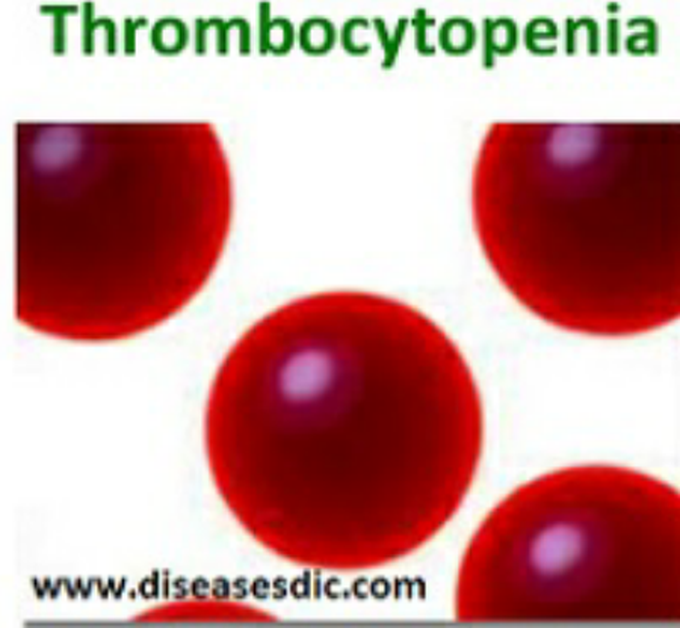


Thrombocytopenia
IntroductionPeople with thrombocytopenia have diminished platelets (Thrombocytes) count in the blood. Platelets are blood cells which help for clotting process. Normal platelets count value is from 150,000 and 450,000 per microliter (one-millionth of a liter). About two-third of platelets are released into the blood stream whereas the remaining are typically present in the spleen. Severe thrombocytopenia causes excessive bleeding.Thrombocytopenia may occur due to the underlying medical conditions:Enlarged spleen may entrap high platelets in various conditions such as cirrhosis, myelofibrosis, and, gaucher disease.Heparin in the blood can be triggered by body immune system causes low platelet count. This condition is called as Heparin Induced Thrombocytopenia (HIT)Non-immune HIT is also pose a reason in which a mild decrease in blood platelets occur.HistoryOsler, Hyam, and Bizzozero were found small particles in the blood flow, these were assumed to be bacteria or the red cell fragments. James homer Wright, identified that the platelets are distinct hematopoietic component arising from megakaryotes.In 1903, William duke described low platelet count in 3 patients, those who were affected with hemorrhagic disease. He created a venous shunt from a healthy donor to a thrombocytopenic recipient and proved that platelet count could rise and bleeding would ceases.CausesThe onset of thrombocytopenia occurs when there is no enough production of blood cells in the bone marrow as in leukemia, lymphoma, aplastic anemia and some anemic conditions.Infection of Human immunodifficiency virus (HIV), Hepatitis C virus, and Epstein-Barr virus (Cause of mononucleosis) also results in thrombocytopenia.When there is massive blood transfusion platelets concentration in the blood may get diluted due to very low platelets in the stored blood.Drugs such as heparin, quinidine and diuretics.Few antibiotics also cause low platelet count some of them are rifampin, vancomycin, chloramphenicol and trimethoprim/sulfamethoxazole.Chemotherapy for leukemia also causes low platelet count in blood.Cardiopulmonary byepass surgery builds up thrombocytopenia.Disseminated intravascular coagulation within blood vessels, blood poisoning (septicemia) due to gram-negative bacteria, cancer, and traumatic brain damage.Bacterial infection of blood (septicemia).Hemolytic-uremic syndrome.Thrombotic thrombocytopenic purpura. In this disease condition small blood clots are formed unfortunately, using large number of platelets throughout the body.Some genetic conditions such as Wiskott-Aldrich and May-Hegglin syndromes lead to low platelet count.Our body destroys its own platelets in the case of autoimmune diseases such as immune thrombocytopenia (ITP)Risk factorsPregnancy women develop mild thrombocytopenia. The exact cause is unknown.Exposure to toxic chemicals such as arsenic, benzene, and pesticides.Alcoholism- alcohol reduces the production of platelets.Taking foods that are low in iron, vitamin B12, or folate makes a temporary reduction in platelet count.Frequent blood transfusion and dialysis.SymptomsIf the thrombocytopenia is mild it may not have symptoms and it can be detected only through routine blood tests for some other reasons. If a person has low platelet counts some of the signs and symptoms include:Petechiae (small reddish spots on skin due to the superficial bleeding into the skin)FatigueJaundicePurpura (easy or excessive bruising)Blood in stool or urineEnlarged spleenNosebleedsDeep vein thrombosisNonstop bleedingUnusual heavy menstrual bleedingContinuous bleeding from the gums or noseProlonged bleeding from cutsBloody or very dark vomitSymptoms ComplicationsAfter a cut or injury, excessive bleeding may occur that causes hemorrhage and major blood lossDangerous internal bleeding can occur when the platelets fall below 10,000 platelets per liter, perhaps blood bleeding through your gastrointestinal tract (digestive system)In rare cases, severe thrombocytopenia may cause bleeding in brain which can be fatalOther complications may occur due to other underlying factors or conditions such as autoimmune thrombocytopenia leads to lupus may be associated with other complications of lupusDiagnosis and testMedical history: Your doctor may ask about factors, medical history and symptoms such as:Medication that you took, including over the counter medicines and whether you drunk beverages that contain quinineGeneral eating habitsAny family history of low plateletsPhysical examination: Doctor will perform the physical examination to look for skin red spots, bruises, spots of blood on the skin and other signs of low platelets. Other signs of infections like fever or rashes will be checked.The following tests may be done:Blood test: The complete blood count test that measures the number of platelets, white blood cells and red blood cells in your blood. If the person has thrombocytopenia, the results of the test will show low platelets level.Blood smear: Blood smear to see the appearance of the platelets under the microscope and to see how healthy they are.Bone marrow tests: this test is to check the bone marrow is healthy or not and to make sure that bone marrow is producing enough blood cells. There are two bone marrow tests are bone aspiration and biopsy. For aspiration, your doctor will take a small amount of fluid from bone marrow by the needle. For a biopsy, your doctor will take a small sample of bone marrow tissue.Other tests: Your doctor may recommend blood clot tests such as prothrombin time (PT) and Partial Thromboplastin Time (PTT) test to see whether your blood is clotting properly. Your doctor may suggest taking ultrasound to see whether you’re his or her spleen enlarged.Treatment and medicationsThe treatment depends on the cause and severity of your condition. If your condition is mild, treatment is not needed. Treatments may include as follows:Blood or platelet transfusionBlood or platelet transfusion is needed when the condition is at high risk of bleeding. During the transfusion, your lost blood is replaced with platelets and red blood cells.SplenectomySplenectomy is the surgery to remove the spleen. This can be done when your medicines don’t help with the condition. This surgery is mostly used for an adult with immune thrombocytopenia.MedicinesMedicines are the first course of treatment. If you have immune thrombocytopenia, your doctor may prescribe drugs to increase your platelets are corticosteroids. These can be given through a vein or by mouth. One example of this type of medicine is prednisone.Your doctor may prescribe immunoglobulins or medicines like rituximab to suppress your immune system. This can be given through a vein. Other medicines such as eltrombopag or romiplostim, to help your body make more platelets.Home remediesPrevention Condition can’t be prevented. But you can take steps to prevent the health problems that associated with thrombocytopenia.Avoid drinking alcohols, it will slow downs the platelet productionAvoid activities and sports that may cause injury and cut that leads to heavy bleedingUse soft toothbrush to prevent bleeding from gumsAvoid medicines that reduce your platelet countTry to avoid contact with the chemical that slows down the production of palates. Chemicals such as pesticides, arsenic, and benzeneBefore getting vaccinated for viruses talk with your doctor to avoid the vaccines that affect your platelet counts
Living with Lupus is often a battle not just against the illness itself, but also against the emotional weight of uncertainty, fatigue, and the toll of long-term medications. For one courageous woman, that battle began in 2013. Diagnosed after Lupus had already affected her joints and internal organs, she was quickly placed on medication that initially helped. But as time went on, her health declined again this time with more frequent flare-ups and increasingly difficult side effects. Like many others with chronic illness, she faced the crushing weight of hopelessness. Each day became harder than the last, and conventional treatments no longer offered the comfort they once did. But in March 2020, at her lowest point, she made a decision that changed everything.Out of desperation and with a healthy dose of skepticism she turned to NaturePath Herbal Clinic, hoping their natural Lupus treatment might offer at least some relief. What happened next went far beyond her expectations.After completing a six-month herbal program, her flare-ups stopped entirely. Her energy returned. The chronic pain that had defined her daily life began to fade. For the first time in years, she felt like herself again. Not just alive but truly living.Her story is not just one of healing; it’s one of resilience, open-mindedness, and the courage to try something new when all else fails. By sharing her journey, she hopes to offer something priceless to others living with Lupus: hope.This treatment has been a true breakthrough for her. If you’re searching for a safe, natural, and effective alternative, I genuinely recommend giving this a chance.”www.naturepathherbalclinic.com or email them at info@naturepathherbalclinic.com


